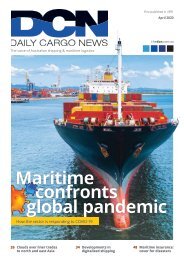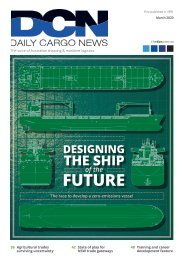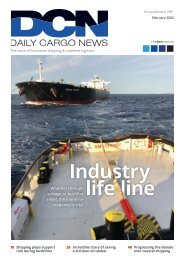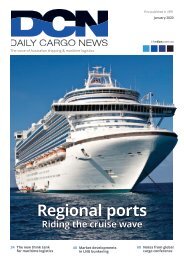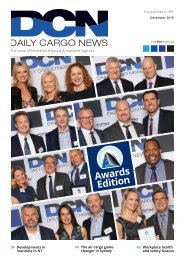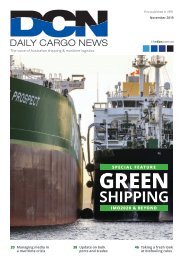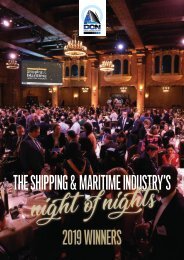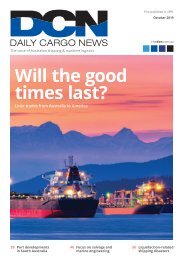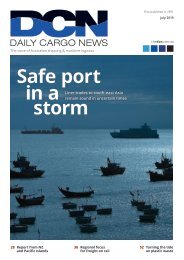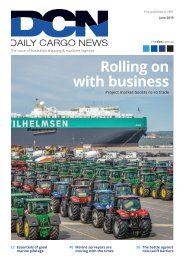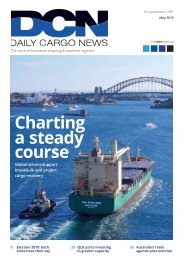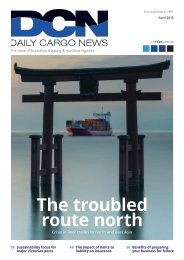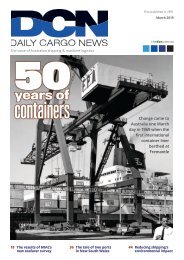DCN September Edition 2019
You also want an ePaper? Increase the reach of your titles
YUMPU automatically turns print PDFs into web optimized ePapers that Google loves.
REEFER TRADES<br />
Heidi Wittle,<br />
technical officer<br />
protected cropping team, QLD<br />
Department of Agriculture<br />
SOWING SEEDS FOR THE FUTURE<br />
OF REFRIGERATED EXPORTS<br />
A refrigerated sea container trial has been done at Port of<br />
Townsville, building capacity for horticultural exports direct<br />
from north Queensland.<br />
The three-week trial, with specialty melons, will provide<br />
primary information on optimal harvest time and shelf life<br />
validation for sea transportation of Burdekin-grown fruit to Asia.<br />
Port of Townsville’s trade development manager Maria<br />
James says, “At present growers in north Queensland send<br />
their produce south for export, which adds to their supply<br />
chain costs and delivery time.<br />
“The success of this trial could assist the region’s growers<br />
by reducing transportation costs and ensuring their<br />
customers are getting faster fresher produce, boosting<br />
the capacity and sustainability of north Queensland’s<br />
horticultural sector.”<br />
The project is funded through the Queensland<br />
Government Growing Queensland’s Food Exports pilot<br />
program and supported by global shipping line ANL that<br />
provided its reefer expertise and the use of a refrigerated<br />
sea container for the trial.<br />
Shane Walden, chief commercial officer of ANL says,<br />
“Australia has progressed to be thought of as the food bowl<br />
of Asia and we want to ensure our premium quality produce<br />
is enjoyed by all – it’s channels like these that help promote<br />
our grower’s product.<br />
“Leveraging ANL’s refrigerated containers and valueadded-services<br />
such as Controlled Atmosphere and Cold<br />
Sterilisation in Transit, exporters can protect the quality of<br />
their commodities by managing influencing factors like CO2,<br />
humidity, ventilation and temperature.<br />
“ANL’s broad coverage also provides opportunity for<br />
customers to export to south-east Asia and beyond.<br />
Servicing the major hubs of Singapore and Port Kelang,<br />
customers can tranship their cargo anywhere in the world,<br />
leveraging the CMA CGM Group’s global network.”<br />
The Department of Agriculture will now analyse the<br />
results of the reefer trial, which was just one part of a project<br />
investigating the logistics chain of specialty niche melons to<br />
the Japanese market.<br />
Ms James says she hopes trials like this will help build a<br />
case for the revitalisation of direct exports from Townsville<br />
to Asia.<br />
“Back in the 1990s, Townsville had direct lines coming in here<br />
from Japan… and we have a world-class cold storage facility on<br />
our doorstep with import licenses for China,” she says.<br />
“With the recent upgrade of Berth 4 at the port we are<br />
serious about developing container trade in the north.<br />
“This should be a regional hub, we’re two days closer<br />
to Asia [than Brisbane]… it’s really about getting people to<br />
change their existing supply chain practices.”<br />
Demand for reefers in Australia is influenced largely by seasonal<br />
factors, says Seaco.<br />
“We’re coming up to the Christmas peak with a lot of domestic<br />
bookings, that will pick up in the next six to eight weeks. We see<br />
steady growth,” Mr Fedden says.<br />
From Hapag-Lloyd’s point of view, it has a strong reefer presence<br />
in Australia and New Zealand with weekly direct service from main<br />
ports of both countries to almost all the main ports in Asia.<br />
“The challenge in Oceania, as an primary agricultural producer,<br />
is the weather and drought in terms of what is produced from time<br />
to time,” Mr Bhiwandiwalla says.<br />
“Another challenge is that exports are higher than imports so we<br />
can experience equipment challenges.”<br />
REEFER INNOVATION<br />
The latest research suggests that by the end of last year, around<br />
2.5% of the global container fleet had been fitted with smart<br />
technology – devices that show a container’s location in real time,<br />
as well as status information about the goods inside.<br />
That means around 250,000 units, largely reefer containers<br />
led by Maersk’s remote container management system, and other<br />
carriers have begun to follow suit.<br />
London-based consultant Drewry estimates that by 2023, nearly<br />
2.5 million units – 6.5% of the global container fleet – could be<br />
fitted with the technology.<br />
Key to this growth will be the development of a set of<br />
interoperability standards – one of the chief remits of the<br />
recnetly created Digital Container Shipping Association – that<br />
will allow carriers and others the opportunity to work with<br />
smart containers from different manufacturers and operating<br />
on different IT systems.<br />
We are seeing the Oceania market<br />
growing positively by 4-5% annually and<br />
expect that trend to continue.<br />
Mehernosh Bhiwandiwalla, Hapag-Lloyd<br />
One of Hapag-Lloyd’s biggest initiatives at present is in fitting its<br />
entire reefer fleet with technology for remote control monitoring.<br />
“Hapag-Lloyd LIVE is a significant initiative to fit the whole<br />
reefer fleet with remote monitoring technology. Obviously new<br />
reefers are already fitted with this technology including the<br />
reefers purchased this year. It’s in the final stages of testing,” Mr<br />
Bhiwandiwalla says.<br />
Part of Hapag-Lloyd’s 2023 goal to achieve about 10% of profitable<br />
reefer business globally (IRT Asia trade excluded), is to maintain the<br />
highest quality reefer fleet but also to serve niche markets.<br />
“An example would be our new Caribbean Express service which<br />
offers customers access to main markets in north Europe with<br />
weekly and fast transit times,” Mr Bhiwandiwalla says.<br />
“The company is focused on developing its offering in 20-foot<br />
reefers, solutions to pharmaceutical markets, value add of<br />
Controlled Atmosphere and Cold Treatment containers and in<br />
transportation of dangerous goods in containers.”<br />
Shipping line MSC believes it has a reefer fleet that is one of the<br />
“largest and most advanced” in the world.<br />
Dept. of Agriculture<br />
50 <strong>September</strong> <strong>2019</strong><br />
thedcn.com.au



